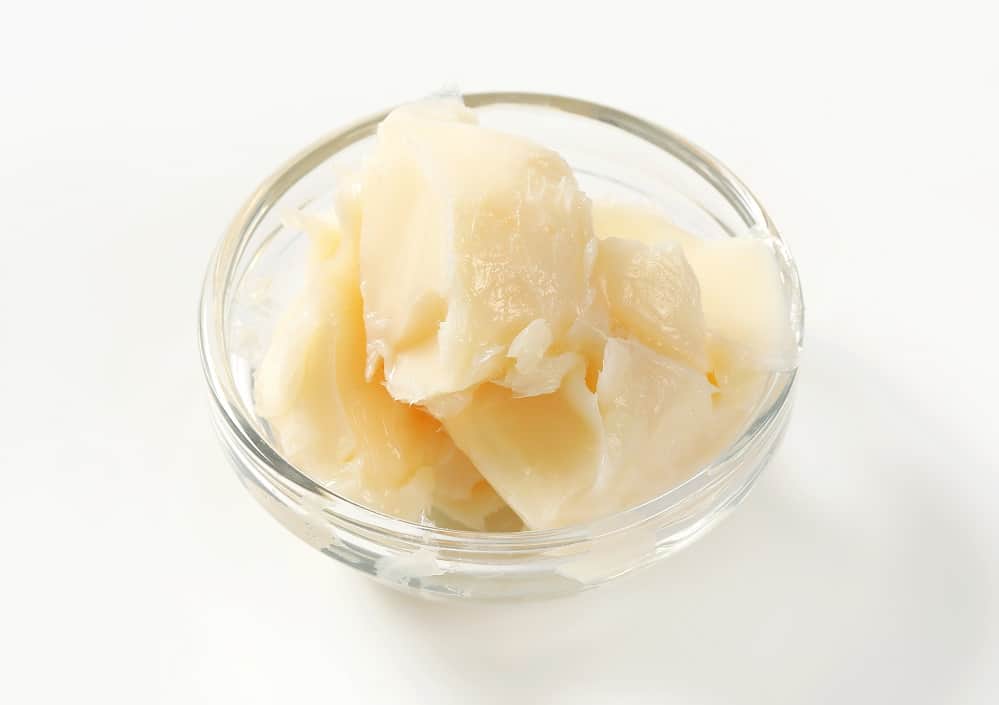Shortening is a common ingredient, especially in pastries and other baked goods as it helps give these types of food a crumbly texture. Aside from baking, shortening also used extensively when frying food. Defined as any fat that presents as a solid at room temperature, it is important to understand the nature of such a common food ingredient. Vegans would also be interested to know if whether shortening is acceptable in vegan diets or not.
Since shortening can be made of any fat that is solid at room temperature, shortening can be made from fats derived from both animals and plants. Thus, shortening by itself can be considered a gray area ingredient – a substance that could be vegan or not, depending on certain factors. Certainly, shortening made from animal fats such as lard is not vegan. However, shortening specifically made from vegetable oils should be fine for dietary vegans.
Table of Contents
What is Shortening?

Defined as any fat that is solid at room temperature and can be used for cooking, shortening can actually refer to several products that can be commonly found in the kitchen such as lard, margarine, and hydrogenated vegetable oils.
Nowadays, shortening is often made of vegetable oils such as palm oil, soybean oil, and cottonseed oil.
Shortening is primarily used in baking. Aside from butter, it is one of the ingredients that add fat to the baked good. The method of adding shortening into the pastry dough is called ‘cutting in’ as the fat is effectively mixed into the dough using a blender or two knives.
The use of shortening in baking characteristically provides the resulting baked goods with a crumbly or crusty texture.
Shortening is often said to get its name from how it shortens the gluten strands in wheat flour. Without shortening, the gluten strands in flour stretch and form a matrix that gives the resulting baked good a chewy and stretchy texture, like in bread.
Aside from baking, shortening can also be used in frying. Since shortening is essentially a lipid that is solid at room temperature, shortening can also be melted down into an oil. Many people would use shortening for frying or deep frying instead of cooking oil.
Shortening Production
The definition of shortening technically encompasses both animal and plant fats. However, since the advent of hydrogenation, commercial shortening is conventionally produced that way.
Vegetable oils are characteristically polyunsaturated which means that their chemical structures contain multiple carbon double bonds within a hydrocarbon structure. These double bonds cause kinks in the structure which lower the melting point of these vegetable oils. As a result, these vegetable oils exhibit as a liquid at room temperature.
Hydrogenation is when hydrogen atoms are added to the chemical structure of a substance. In vegetable oils, the addition of these hydrogen atoms completes the hydrocarbon structure and removes the double bonds initially found in the vegetable oils. The loss of the double bonds in the structure of the vegetable oils significantly increases the melting temperature of these oils. Hence, hydrogenated vegetable oils, or shortening, becomes solid at room temperature.
Companies that produce shortening also experiment with how many of the double bonds are removed. Conceptually, the more double bonds removed through hydrogenation, the harder the shortening becomes. Thus, some companies would opt for partial hydrogenation to make a relatively softer product.
Additionally, some companies would also add mono- and diglycerides as an emulsifier. Shortening imbued with these emulsifiers allows bakers to add more water to their baked goods. Emulsifiers also help baked goods retain water longer, leading to moist baked goods and pastries.
Is Shortening Vegan?
It is difficult to categorize shortening as vegan or not due to the flexibility of the word’s definition. Technically, shortening refers to a fat that is solid at room temperature used in cooking. However, the sources of that fat can either be from animals or plants. Thus, shortening can either be vegan or not.
For one, shortening made from animal fat such as lard or tallow is surely not vegan since these types of shortening are specifically derived from animals.
However, there are kinds of shortening that are completely made of vegetable oils. In this case, an all-vegetable type of shortening is then considered vegan since it would be devoid of animal products or derivatives. Thus, it is important to check the ingredients listed in the shortening product chosen.
Another ingredient that can be found in many shortening products is glycerides. These glycerides are often added to act as an emulsifier to allow proper mixing with water when used for baking. However, glycerides are commonly considered as gray area ingredients because these are substances that can be obtained from both animals and plants as well. However, if the shortening product claims to be completely made of vegetables, then that could be a sign that the glycerides used are plant-derived as well.
Learn More: Is Crisco Vegan?
Food that Contains Shortening
The definition of shortening can be loosely used to encompass other products such as lard, butter, margarine, and vegetable oils. With such a widely encompassing definition, it should come as no surprise that one would be able to find shortening used in a variety of food products.
For example, shortening is primarily used in baking. Thus, it can be assumed that baked goods and pastries, especially ones that have a crumbly or flaky texture, would contain shortening. These baked goods can include donuts, cakes, cupcakes, pie crusts, cookies, and so on.
Is Shortening Safe?
Many people are concerned that shortening might be unsafe since it is completely made of fats. However, in proper moderation, shortening is completely safe and does not pose any adverse health effects in the long run.
However, one big issue that concerns shortening is trans fat. Throughout the years, numerous studies have found that trans fat can increase risks of various health effects such as heart disease and stroke (1). Trans fat has also been found to impair the nervous system, affecting both brain and psychological health.
Fortunately, the FDA has required that product labels include the amount of trans fat in products. Since the raised awareness, many companies that produce shortening have aimed to reduce the amount of trans fat in their products.
References




